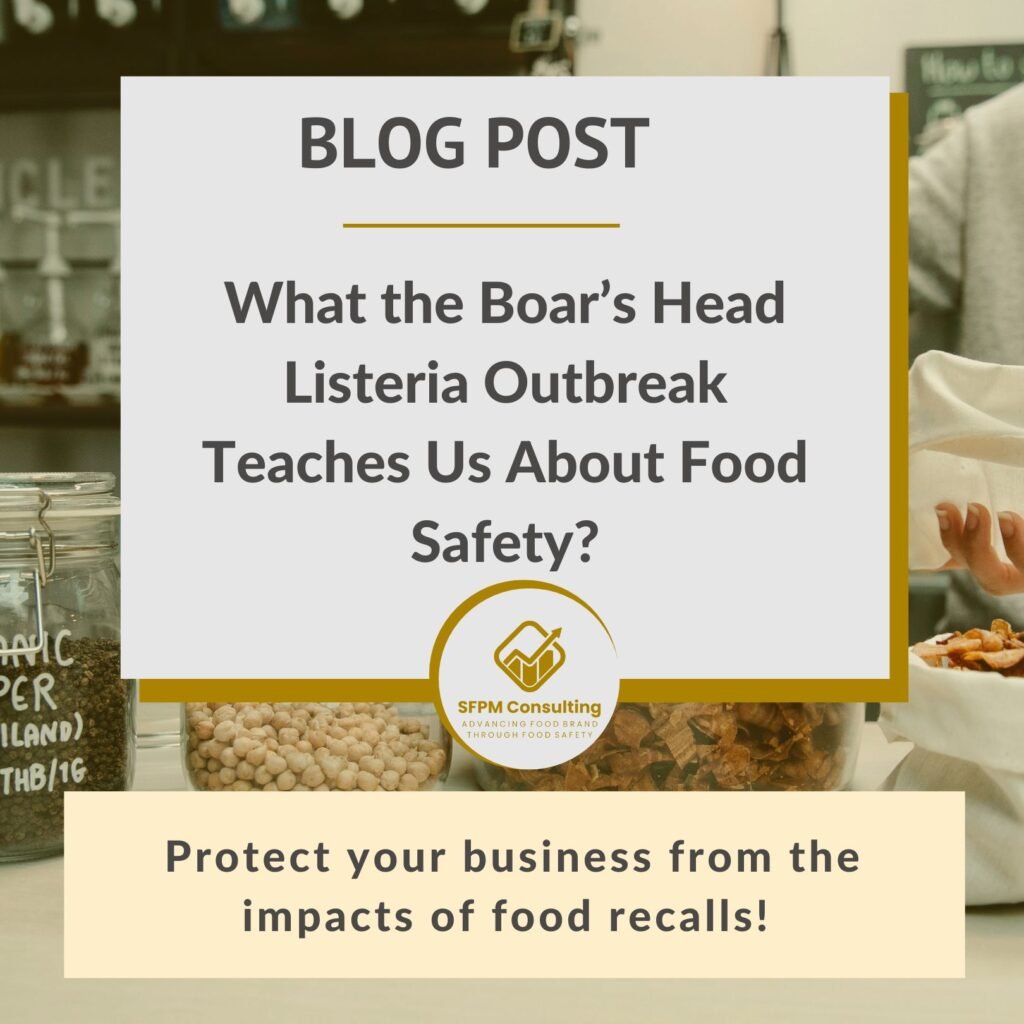Sharing my new case study that many will remember for long because the brand is a well-known company and existed for a long time.
Introduction to the Boar’s Listeria Outbreak
In July 2024, Boar’s Head, a well-known producer of deli meats, faced a significant food safety crisis. A listeria outbreak linked to their products led to the recall of over 7 million pounds of meat, hospitalizing dozens and tragically resulting in multiple deaths. This incident is a powerful reminder of the importance of robust food safety practices.
This blog’ll explore key lessons learned from the Boar’s Head listeria outbreak and how similar crises can be avoided.
Understanding Listeria and Its Risks
What Is Listeria?
Listeria monocytogenes is a bacteria that causes listeriosis, a serious infection. Unlike many pathogens, listeria can thrive in cold environments, such as refrigerators, making it particularly dangerous in food processing. It can cause severe health issues, especially in vulnerable populations like pregnant individuals, the elderly, and those with weakened immune systems.
How Does Listeria Contaminate Food?
Listeria often contaminates food through contaminated soil, water, or animals. It can persist in food processing environments, making it challenging to eradicate. In the Boar’s Head case, listeria was found in deli meats sliced at grocery store counters, highlighting the risk associated with these products.
Symptoms of Listeriosis
Symptoms of listeriosis include fever, muscle aches, nausea, and diarrhea. In severe cases, it can lead to more serious conditions like meningitis and sepsis. Pregnant individuals may face the risk of miscarriage, and the elderly can experience severe complications.
What Happened Leading to the Boar’s Listeria Outbreak?
The core issues behind the recall revolved around poor management practices and a failure to follow up on inspection recommendations, leading to a preventable situation that ultimately impacted consumer safety.
Here’s a breakdown of what happened and the contributing factors:
Key Events:
- Lack of Follow-up on Inspection Findings: Inspection report from US FSIS may have flagged potential risks—such as hygiene issues, equipment contamination, or improper storage temperatures—that the company did not address properly. The lack of follow-up on these critical inspection findings allowed the risk of contamination to persist and increase.
- Failure in Food Safety Monitoring: The company likely had insufficient oversight of its food safety procedures, including Good Manufacturing Practices (GMPs) and Hazard Analysis and Critical Control Points (HACCP). Management might not have enforced these controls rigorously, or there were gaps in the system, leaving room for Listeria to contaminate the product.
What Likely Happened during these type of cases:
How did Management and Lack of Follow-up contribute to the Boar’s Recall?
- Inadequate Preventative Measures: Management failed to take adequate preventative measures, either by ignoring prior warnings or not investing in better equipment, sanitation, or staff training. If leadership had been more proactive in addressing potential risks, the contamination might have been avoided.
- Lack of Inspection Follow-Through: A major contributing factor was the failure to act on inspection results. Inspections are meant to identify weaknesses in food safety practices. When a company doesn’t follow through with corrective actions after an inspection, identified risks can grow and lead to contamination.
- Poor Communication and Oversight: Often, in such cases, there is a disconnect between different departments (e.g., production, quality assurance, and management). If management doesn’t effectively communicate the seriousness of food safety risks, the team may not prioritize follow-up actions, leaving safety gaps unaddressed.
- Failure to Build a Safety-First Culture: In many food safety recall cases, including this one, the company culture plays a huge role. Management’s failure to instill a culture that prioritizes food safety can lead to lapses in day-to-day operations, where employees may not take sanitation or preventive measures seriously.
Just a really good food safety reminder: Recall Lawsuits and Shutdown
Impact of Non-Compliance
The Boar’s Head recall illustrates the severe impact of non-compliance. Beyond health risks, non-compliance can damage a brand’s reputation, lead to financial losses, and result in legal consequences.
Currently, they are facing legal lawsuits and the Virginia plant has been permanently closed.
Adhering to food safety standards is essential for avoiding these risks.
The Boar’s Head listeria outbreak is a stark reminder of the importance of food safety. The outbreak and company reputation (and survival) can be prevented by implementing rigorous protocols, following up on inspection findings and responding promptly to issues.
Would you hire staff that is directly involved in any controllable recall incident?
Every serious recall like this breaks my heart, but it is a great case study to showcase why we need to be mindful of inspection findings. Taking things for granted would not last long. You don’t want to keep a time bomb waiting to explode for your brand.
If you have a challenge with your food safety program and need help, don’t take it alone. You can get help. We will help clients who are willing to improve their food safety and food safety culture and build an easy-to-follow program. We helped train many food workers and QA staff to meet food safety expectations. It is important.
What I cannot do is to force you to improve your program. Our client’s success depends a lot on our client following our guidance.
References:
CBS Interactive. (n.d.). Boar’s head faces multiple lawsuits after its deli meat is linked to deadly listeria outbreak. CBS News. https://www.cbsnews.com/news/boars-head-recall-listeria-deli-meat-lawsuits/
Gibson, K. (2024, September 13). Boar’s head shutters Virginia plant tied to deadly listeria outbreak. CBS News. https://www.cbsnews.com/news/boars-head-plant-closure-listeria-outbreak-liverwurst/
US FSIS Non-Compliance Report Establishment Number M12612+p12612 from 06/01/2023 to 07/29/2024. (n.d.). https://www.fsis.usda.gov/sites/default/files/media_file/documents/Non-Compliance_Reports_112022-To-812024.pdf

